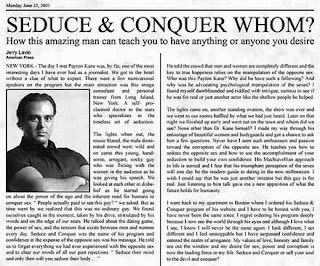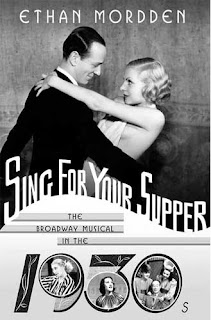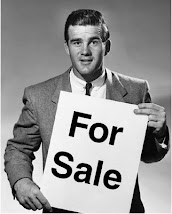Monday, 23 November 2009
Dear Jim
I wish the boom was back because selling was so easy. I would write a pleasant e-mail that would chat in a non-specific, wooly way that tends to provide the comfort that over-busy executives like yourself. It would repeat a few 'hot buttons' from any received scope and talk about delivery in such a way that a skim read would infer we said we could do it while a more detailed read would reveal nothing but 5 different ways to say how loverly everything was....
And because you were busy and because reading my e-mail was quick and there was no emotional energy expended in really worrying about value for money; after all you can't seem to spend it fast enough; you simply said yes.
Now you want value for money, I have to work a little harder again.....
Consultant
Bringing in hired help....
The main focus of this book / blog is to help you navigate your way through that process, BUT, there may come a time when you may need to bring in some new help. Yes, I'm talking about hiring....
If you are a small professional services company, how do you hire someone to come into your business and sell it with the same passion as you?
You can't - so don't try!!
Don't try and hire someone like you.
The whole premise of this book is that the best professional services salesmen tend to be the best practitioners of professional services: it is often simply portrayed in their body language. Clients will ask themselves "can this person do the assignment" and the answer needs to be yes! So, wherever you are in your staff development, you must always try to encourage your consultants to sell and develop business.
However, you will need to hire at some time (I need to right now at the moment!) and so what questions should you ask:
1. Ask about priorities - client vs lead
2. Ask about process - let them explain a process they have successfully used (you may be able to inherit one here so keep an open mind!)
3. What, in their opinion, is the best marketing tool (we know the answer, do you think they will get it?)
4. How would they prepare for a conference?
5. Do they have a philosophy for professional services sales
6. Key differences between professional services sales and equipment/product sales.
There are more here - write them down; answer them yourself and compare answers. Don't expect a full score and prepare to question them and challenge them.
Sunday, 8 November 2009
Farming
It starts with talking to clients and potential clients regularly - finding a reason to talk with them on a semi-regular basis; say one a quarter or twice a year. What do you think you would talk about? How do you start the conversation?
Well - you would assume that the client and you follow the same market so perhaps there is something to talk about in the market; seems like a good place to start!!
Developing a process to monitor and prompt the calls is not difficult but, as always, it's the DISCIPLINE that makes the difference - was that word in "what world class sales organisations do", oh yes, I think so....
Tuesday, 20 October 2009
Making the most of conferences

Conferences are hard work and can be sometimes a little soul destroying. Get the delegate list, identify your targets, book meetings, prepare for 2 days of squalid drudgery that comes to nought when you walk into the conference centre and decide that anything would be better than this and book into the spa for 2 days of colonic irrigation. But you're a professional so you carry on as you'd planned and practice your coffee break patter and your teasing ‘glimpses of value’.
You do your duty to the boss and the bank, and during the course of the conference take every opportunity to reinforce the shallow and meaningless friendships you've made during greasy breakfasts, luke warm lunches and distinctly dodgy dinners.
Obviously it's very different if you're paying for your people to go. Then it's all about structure and discipline. Get them to commit to getting clients there, set targets for handshakes, kisses, business cards and follow-up and measure the ROI for their damaged liver. I'm told that poachers often make the best gamekeepers.
Saturday, 17 October 2009
What do world class organisations do?
 When you cut through all the bull, and there's plenty of it, as the new business responsible fool in your firm, it'd be nice to have a benchmark of what makes the difference between the sharpest operators in the field, and the 'bottom-feeders' wouldn't it?
When you cut through all the bull, and there's plenty of it, as the new business responsible fool in your firm, it'd be nice to have a benchmark of what makes the difference between the sharpest operators in the field, and the 'bottom-feeders' wouldn't it?
Here's a really simple chcklist for you to use to think about your business. The question is, the only question is, how do you compare?
I know where we sit, and knowing that really helps to get me to be hard and clear about what we need to keep and what (who) we need to lose. Great sales businesses are very clear about-
VALUE....
- They clearly understand what they do and exhibit focus and discipline
- They understand the value of what they do
- They communicate the value to clients unequivocally, without excuses, without arrogance.
PROCESS... HARD SKILLS
- They set measurable farming goals, marketing and profile raising
- They ingrain a culture of continuous farming (sowing the seeds of future growth)
- They have transparent incentive programs that are continuously monitored
MORE PROCESS... SOFTER SKILLS
- They prepare for meetings carefully
- They write strong proposals that communicate value (and they follow up)
- They deliver strong pitches
- They maintain clients through strong project delivery
- They always follow up and project review with the client
What is the best marketing tool?

Is it e-mail campaigns, is it free pens, or mouse mats? Is it talking at conferences, Schmoozing? Is it direct mail or is it cold calling to sell meetings and then snazzy presentations? Is it fancy brochures or interactive CDs? Or is it simply doing really, really good work?
Do you measure where your leads come from? We all need leads (we call it farming in here. Whatever it's called it's all about “sowing the seeds” of the future income.) and the ideas above are all valid and may all have a place in your armoury of weapons against the apathetic or un-enlightened client. However, you make life so much easier on yourself and add tremendous value to your business if your largest source of leads is “previous work”.
So, assuming that you do great work we can get started on growing your business.
Speaking at a conference

My experience tells me that there is not much point going to a conference unless you can address everyone in the room. If you do get a slot, push to get on during the first day or even the first morning – it makes a difference as drink-sodden conference audiences tire quite quickly on the second day.
- Aim for no text except titles, not always possible but a target!
- If you read slides you should, in my opinion, be shot
- 15-20 slide max (ALWAYS)
- Tell them your message at the start, tell them again in the middle and remind them at the end
It is UNBELIEVABLE how bad conference presentations usually are. Tell a story – show some passion and emotion and WOW! What a difference that makes.
Conferences are hard work and can sometimes be a little soul destroying if your expectations are too high. You probably won't make a sale, but you can make 3-5 good drinking buddies who might, over the next year, turn into fee paying clients. So if it still seems like a worthwhile investment-
Get the delegate list, identify targets, invite clients or lapsed clients and book meetings, breakfasts, golf, lunches for while you're there. Practice your coffee break patter; your ‘glimpses of value’ and during the course of the conference take every opportunity to reinforce the contacts you make. This is particularly useful at smaller conferences where you can quickly get with the in crowd…
Conferences for professionals are a bit like weddings for single people, you might not get a snog from the bridesmaid, but she'll happily dance with you all night. What happens when the confetti's swept away rather depends on your sincerity.



